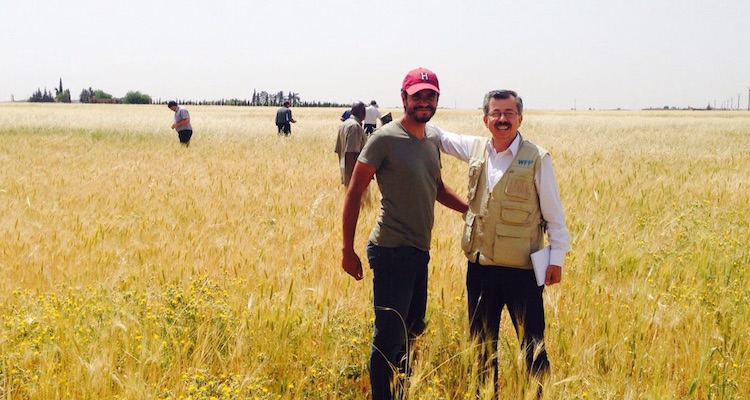Listen Now
What would you do if your job was to figure out, on a global scale, who doesn’t have enough to eat? Or, more importantly, who had insecurity in their life specifically because of food scarcity? Just thinking about the scale of the problem blows my mind a little bit. But then, wait for it, what if you then had to also design and execute interventions that would, to a large degree, address those food security issues. Oh, and did I mention that this is a constantly evolving and changing process? This is exactly what my guest for the 130th episode of the Terms of Reference Podcast does along with the team at the World Food Programme’s Vulnerability and Analysis Mapping Initiative. Jean-Martin Bauer is a Senior Analyst at WFP, where he leads the mobile VAM initiative, which involves deploying digital innovations to collect food security data in near real-time. He has been on the front lines of understanding food scarcity for years and in this episode he tells us about how VAM has evolved since its paper-survey beginnings and where it will go in the future. You can connect with Jean-Martin here: https://twitter.com/bauer_jm https://it.linkedin.com/in/jean-martin-bauer-81967811b
IN TOR 130 YOU’LL LEARN ABOUT
- The Comprehensive Food Security and Vulnerability Analysis task force at WFP
- How surveying and mapping helps keeping a literal world’s view on hunger
- Dealing with food security with reporting issues, conflict zones and “silent victims”
- The importance of listening, enabling technology but making sure it listens to people
- How changing technology is a blessing and a challenge
OUR CONVERSATION FEATURES THE FOLLOWING
Organizations:
Topics:
- Food, Hunger
- Food scarcity
- Ebola
- Food security, in conflict zones
- Interactive Voice Response (IVR)
- SMS
- Blockchain, Distributed Ledger Technology (DLT)
- Mapping
Places:
- Syria
- Congo
- Liberia
- Sierra Leone
- Iraq
EPISODE CRIB NOTES
02:39 The InitiativeComprehensive Food Security and Vulnerability Analysis
A 150 analysts network
What’s happening, what is needed where
“We try to measure world hunger worldwide”
800MM go to bed hungry every night
“There’s a lot of ambition”. Hungry-free world by 2030
Investments and innovation, resilience
04:20 MappingContributions go to a map
Built with government and partners
They run services, visualize, do analytics
Ongoing surveys on shortages and market behavior but also strategies taken up by the hungry
It used to be that vans run around places giving food and gathering data
It proved unsustainable. “We cannot go everywhere”
Detection of “suffering in silence”, cases unreported and unattended. Particularly in Syria and Syria-like places
Dire situations to not require too rigorous a sampling. It is performed monthly to every 3 months
WFP offers incentives to respondents, to promote good participation. “It is one of the good aspects of the project. People have an incentive to reach out” to friend and family in harsh places
People leaving camps are a good indicator of food availability
11:10 VerificationPreliminary on the ground, before surveying. It was done in Congo
Corroboration with third-party data sources
Ongoing visitation, constant follow-up
“Also trust. Relationships with people are important. We don’t do one-offs”
Call centers have the task to reach out and do the phone surveys. “It is cheaper and scales more easily”
Some SMS survey is implemented with the help of Open Source solutions
WFP still probes on technology
14:57 The ‘freakonomics’ of it all“We get a lot of insight from people going above the standard questionnaire”
Ebola in Liberia and Sierra Leone sharp-rose food prices
Just not on the responders side. By blocking passage in roads to block spread, governments were keeping food sellers to do their business
17:07 Food hunger appSmartphone will improve surveying
Telegram as communication device. It is highly used by families in migration situation
When El Niño happened and 3MM were affected by drought, Twitter and other tools made sure food went where it should
Tech is making people make better food decisions
“We need to understand tech better”. SMS is dying out
“We need to keep the ability to work on what works with people”, like voicemail
20:40 It is important to be savvy“It is important to know when something don’t work out”, quit and learn
Interactive Voice Response (IVR) was a dud in Africa
But phone calls have help to get quality data
22:22 Becoming“I had been in West Africa in 2001 for 10 years”
“I don’t have a degree in geek”
“I was interested in automation and databases”
Same tech is used in Africa very differently
A ‘dream job’ came up in Italy
23:47 The Initiative, revisitedLayers
The idea is to help people at their most vulnerable
Mapping helps decision-making
In 2015, the price of a bag of wheat in Iraq was USD 800. “Extreme!”. The place was besieged
“When the bag of wheat in your town goes triple figures, you have a food security problem”
First swaths of data were shared with the UN and partners, it reached thousands within a month
25:57 Drive“Changing technology” is a blessing and a challenge
Mapping and visualization tools are also good but take time for people to get value
“We’re developing new tools for the toolkit”. Soil, Market analysis. Mobile, Big data
More mobile surveys
Transaction analysis
27:56 The next food crisis will“happen quickly, in Southeast Asia or Afghanistan”
Predictive tools are getting better, not wholly trustworthy
People movement and district analysis will allow to better capture signals, through mobile
Research comes from different sources: Canada, Innovation Accelerator, Unilateral independent donors
30:26 Fresh, In-The-Zone, Keen“I don’t read too much. There’s just, so, much”
Patrick Meier (TOR 061): Drones, Robotics for the humanitarian space
A WFP US office identifies cutting edge tech
Blockchain for the humanitarian space
Distributed Ledger Technology (DLT)
Market research, prospection




